
APEC History
The following are basic facts about the previous APEC Economic Leaders' Meetings:
1. APEC 2008 Summit- Lima, Peru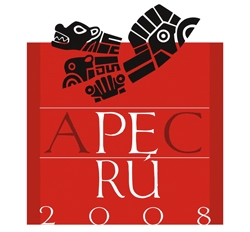 The APEC Peru 2008 summit was the twentieth annual gather of APEC leaders. The meet was primarily a series of political-economic meetings, which were held in Peru between the 21 members of the Asia-Pacific Economic Cooperation (APEC), although business leaders of the region also met before the summit officially began. Leaders from all the member countries met from November 22 to the 23, 2008 in the capital city of Lima.
The APEC Peru 2008 summit was the twentieth annual gather of APEC leaders. The meet was primarily a series of political-economic meetings, which were held in Peru between the 21 members of the Asia-Pacific Economic Cooperation (APEC), although business leaders of the region also met before the summit officially began. Leaders from all the member countries met from November 22 to the 23, 2008 in the capital city of Lima.
The Presidency of Peru, as host of the summit, chose to dedicate the meet to "A new commitment to Asia-Pacific Development." In order to foster such commitment, APEC hopes to integrate various sectors of society in meeting its goals, public and private sectors (PPP), civil society and international financial institutions (IFI). Additional focal points include the development of individuals and the economy as well as devising a cohesive plan to address regional issues including energy security, personal security, climate change and sustainable economic growth.
Other issues under discussion also include: corporate social responsibility, trade liberalization and the financial crisis, Investment "which aims to establish measures in order to provide greater economic integration and free trade among the Economies," anti-corruption and transparency, climate change issues and new ways to reduce risks regarding environmental matters, regional economic integration, Doha Round support, APEC Reform, structural reform, food security, economic and technical cooperation, and global economic issues and human security.
2. APEC 2007 Summit- Sydney, Australia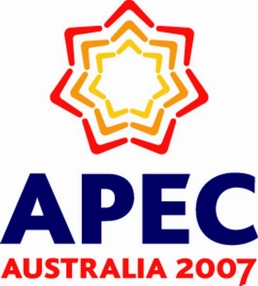 The 15th APEC Economic Leaders meeting took place 8-9 September 2007 in Sydney, Australia. For the first time, APEC Member Economies issued a Declaration on Climate Change, Energy Security and Clean Development outlining future action in support of a new international climate change arrangement and announcing a forward program of practical, cooperative actions and initiatives. Leaders also adopted a major report on closer Regional Economic Integration, including structural reform initiatives, and welcomed the new APEC Trade Facilitation Action Plan which will reduce trade transaction costs by a further five per cent by 2010.
The 15th APEC Economic Leaders meeting took place 8-9 September 2007 in Sydney, Australia. For the first time, APEC Member Economies issued a Declaration on Climate Change, Energy Security and Clean Development outlining future action in support of a new international climate change arrangement and announcing a forward program of practical, cooperative actions and initiatives. Leaders also adopted a major report on closer Regional Economic Integration, including structural reform initiatives, and welcomed the new APEC Trade Facilitation Action Plan which will reduce trade transaction costs by a further five per cent by 2010.
3. APEC 2006 Summit- Hanoi, Viet Nam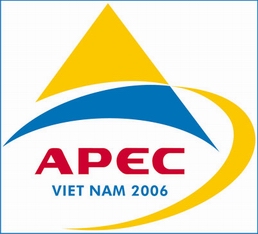 The 14th APEC Economic Leaders' Meeting was held from 18-19 November 2006 in Hanoi, Viet Nam. The theme of this summit was "Towards One Dynamic Community for Sustainable Development and Prosperity" .
The 14th APEC Economic Leaders' Meeting was held from 18-19 November 2006 in Hanoi, Viet Nam. The theme of this summit was "Towards One Dynamic Community for Sustainable Development and Prosperity" .
Leaders issued the Hanoi Declaration which reaffirms their endorsement of the outcomes of APEC 2006 and the future development of the forum.
4. APEC 2005 Summit- Busan, Korea 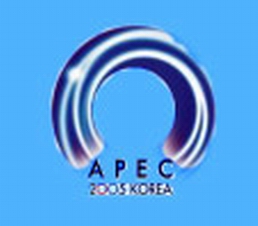 Leaders from APEC's 21 members met in Busan, Korea, November 18-19, 2005, for the 13th Asia-Pacific Economic Cooperation (APEC) Economic Leaders' Meeting (AELM). Leaders exchanged views on the economic challenges facing the region and gave direction to APEC's wide-ranging activities in support of trade and investment liberalization and facilitation, and the security of the Asia-Pacific region. The stability and growth of the Asia-Pacific region is of vital importance to the world economy and to Canada.
Leaders from APEC's 21 members met in Busan, Korea, November 18-19, 2005, for the 13th Asia-Pacific Economic Cooperation (APEC) Economic Leaders' Meeting (AELM). Leaders exchanged views on the economic challenges facing the region and gave direction to APEC's wide-ranging activities in support of trade and investment liberalization and facilitation, and the security of the Asia-Pacific region. The stability and growth of the Asia-Pacific region is of vital importance to the world economy and to Canada.
The 2005 Leaders' Declaration contains important references to both trade and security initiatives in the Asia-Pacific region.
5. APEC 2004 Summit- Santiago, Chile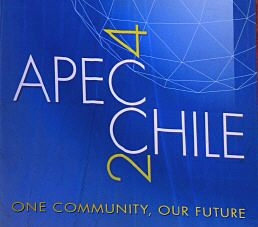 Leaders from 21 Pacific Rim economies met in Santiago, Chile, November 20 - 21, 2004, for the 12th Asia-Pacific Economic Cooperation (APEC) Economic Leaders' Meeting (AELM). Leaders gathered to exchange views on the economic challenges facing the region and to provide direction to APEC's wide-ranging activities in support of trade and investment liberalisation and sustainable long-term growth and prosperity. The stability and growth of the Asia-Pacific region is of vital importance to the world economy and to Canada.
Leaders from 21 Pacific Rim economies met in Santiago, Chile, November 20 - 21, 2004, for the 12th Asia-Pacific Economic Cooperation (APEC) Economic Leaders' Meeting (AELM). Leaders gathered to exchange views on the economic challenges facing the region and to provide direction to APEC's wide-ranging activities in support of trade and investment liberalisation and sustainable long-term growth and prosperity. The stability and growth of the Asia-Pacific region is of vital importance to the world economy and to Canada.
The 2004 Leaders' Declaration contains important references to both trade and security initiatives in the Asia-Pacific region.
6. APEC 2003 Summit- Bangkok, Thailand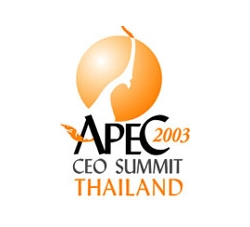 The APEC Economic Leaders Meeting (AELM) took place in Bangkok, Thailand, on October 20-21.
The APEC Economic Leaders Meeting (AELM) took place in Bangkok, Thailand, on October 20-21.
This year's theme "A World of Differences: Partnership for the Future" focussed Leaders' discussions on international trade and the fight against terrorism. In this context, Leaders have firmly reaffirmed their support to the ongoing negotiations in the World Trade Organization (WTO) under the Doha Development Agenda (DDA), which has the potential to bring large gains to all WTO members.
Furthermore, Leaders expressed their will to better co-ordinate their counter-terrorism activities and to increase their technical assistance activities aimed at helping developing economies better fight terrorism. The declaration contains commitments with respect to dismantling trans-national terrorist groups, eliminating the severe and growing danger posed by the proliferation of weapons of mass destruction, and confronting other direct threats to the security of the APEC region.
In the immediate aftermath of SARS, which affected several member economies, Leaders endorsed the implementation of the APEC Action Plan on SARS and a Health Security Initiative to help APEC prevent and respond to regional health threats, including naturally-occurring infectious disease and bio-terrorism.
7. APEC 2002Summit- Los Cabos, Mexico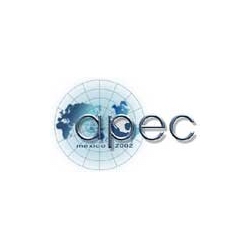 The APEC Economic Leaders Meeting (AELM) took place in Los Cabos October 26-27. The Leaders' Meeting focussed on the battle against terrorism and the promotion of shared prosperity as a consequence of globalization. The juxtaposition of the two issues served to highlight the interdependence of security and economic prosperity.
The APEC Economic Leaders Meeting (AELM) took place in Los Cabos October 26-27. The Leaders' Meeting focussed on the battle against terrorism and the promotion of shared prosperity as a consequence of globalization. The juxtaposition of the two issues served to highlight the interdependence of security and economic prosperity.
In the immediate aftermath of the hostage-taking in Moscow, and the bombings in Indonesia and the Philippines, Leaders re-committed APEC to the battle against terrorism and launched the Secure Trade in the APEC Region (STAR) initiative, a specific program of measures to enhance security in the transportation sector.
On globalization, the Mexican theme of complementing APEC's economic and trade liberalization goals with social and development targets was prominent. Developing countries expanded on the theme by noting the importance of trade- and terrorism-related capacity-building in the quest for shared economic prosperity.
8. APEC 2001 Summit- Shanghai, China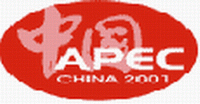 The APEC Economic Leaders Meeting (AELM) took place in Shanghai October 20-21. It was preceded by the Annual Joint Meeting of Ministers of Foreign Affairs and Trade on October 17-18.
The APEC Economic Leaders Meeting (AELM) took place in Shanghai October 20-21. It was preceded by the Annual Joint Meeting of Ministers of Foreign Affairs and Trade on October 17-18.
In the first major meeting of heads of governments since the September 11 terrorist attacks on the United States, APEC Economic Leaders identified specific measures to combat terrorism, called for a new round of multilateral trade negotiations to reinvigorate the world economy, and approved a "Shanghai Accord" to revitalize APEC's trade and investment liberalization efforts. Leaders clearly expressed the view that, in order to help reverse the current economic downturn, it is essential to increase economic confidence through commitment to trade and investment liberalization and a new round of trade negotiations. APEC has an important role to play in this process.
Leaders agreed that it is important to demonstrate the benefits of liberalization for the economic well being of people at large, and for a new trade round to be framed within a strong development focus.
The issue of terrorism was an unprecedented foray for APEC into political issues. It shaped the deliberations in three important ways: the need to agree on a statement that combined political messaging as well as specific cooperative measures; a greater urgency to addressing the economic downturn and bolstering consumer and investor confidence; and an enhanced discussion among Leaders of the regional economic situation and the impact of terrorism.
9. APEC 2000 Summit - Brunei, Darussalam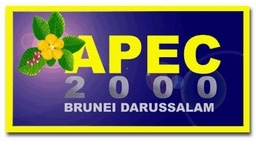 APEC Economic Leaders met November 15-16, 2000 in Brunei Darussalam, the smallest of APEC's 21 member economies, for the eighth annual APEC Economic Leader's Meeting (AELM). Leaders concentrated their discussions on four complex challenges:
APEC Economic Leaders met November 15-16, 2000 in Brunei Darussalam, the smallest of APEC's 21 member economies, for the eighth annual APEC Economic Leader's Meeting (AELM). Leaders concentrated their discussions on four complex challenges:
• managing globalization by promoting effective structural adjustment in their economies;
• identifying the steps needed to fully develop the growth potential of the new economy, including placing more emphasis on human resources development;
• strengthening the multilateral trading system by encouraging the launch of a new round of WTO trade negotiations in 2001; and,
• addressing how APEC, as an institution, can best adapt to meet the diverse needs and interests of its citizens by building broader partnerships.
10. APEC 1999 Summit- Auckland, New Zealand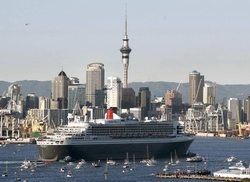 New Zealand was host of the Asia-Pacific Economic Cooperation (APEC) forum events in 1999, which culminated in the 7th APEC Economic Leaders' Meeting (AELM) in Auckland, New Zealand, from September 12-13, 1999. Leaders' discussions focussed on the challenges of sustaining domestic economic reform and liberalization as the region continued to recover from the financial crisis. In their Declaration, leaders also reaffirmed the importance of promoting open, transparent and well-governed markets (particularly domestic financial markets) and to achieving the goals of free and open trade and investment in APEC by 2010/2020, as they had agreed at the 2nd APEC Economic Leaders' Meeting in Bogor, Indonesia.
New Zealand was host of the Asia-Pacific Economic Cooperation (APEC) forum events in 1999, which culminated in the 7th APEC Economic Leaders' Meeting (AELM) in Auckland, New Zealand, from September 12-13, 1999. Leaders' discussions focussed on the challenges of sustaining domestic economic reform and liberalization as the region continued to recover from the financial crisis. In their Declaration, leaders also reaffirmed the importance of promoting open, transparent and well-governed markets (particularly domestic financial markets) and to achieving the goals of free and open trade and investment in APEC by 2010/2020, as they had agreed at the 2nd APEC Economic Leaders' Meeting in Bogor, Indonesia.
11. APEC 1998 Summit- Kuala Lumpur, Malaysia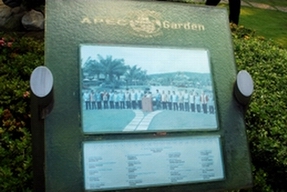
In their Declaration, Leaders agreed to pursue a cooperative growth strategy to end the financial crisis. They pledged efforts to strengthen social safety nets, financial systems, trade and investment flows, the scientific and technological base, human resources development, economic infrastructure, and business and commercial links so as to provide the base and set the pace for sustained growth into the 21st century. Leaders adopted the Kuala Lumpur Action Program on Skills Development with the objective to contribute towards sustainable growth and equitable development while reducing economic disparities and improving the social well-being of the people, through skills upgrading/improvement.
12. APEC 1997 Summit - Vancouver, Canada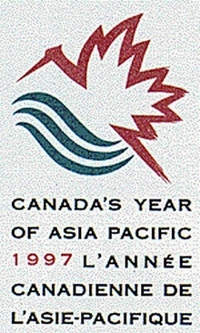 Canada hosted the 5th APEC Economic Leaders' Meeting (AELM) in Vancouver, November 24-25, 1997. Leaders focused their discussions on financial developments in the Asia-Pacific region.
Canada hosted the 5th APEC Economic Leaders' Meeting (AELM) in Vancouver, November 24-25, 1997. Leaders focused their discussions on financial developments in the Asia-Pacific region.
Declaration: In their Declaration, leaders agreed to strengthen APEC cooperation in support of the International Monetary Fund. They endorsed the Vancouver Framework for Enhanced Public-Private Cooperation on Infrastructure, and called for further efforts to ensure long-term sustainability especially in highly populated urban centres.
13. APEC 1996 Summit - Subic, Philippines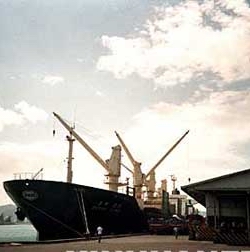 The Philippines hosted the 4th APEC Economic Leaders' Meeting (AELM) in Subic, on November 25, 1996.
The Philippines hosted the 4th APEC Economic Leaders' Meeting (AELM) in Subic, on November 25, 1996.
Declaration:In their Declaration, leaders endorsed the Manila Action Plan for APEC (MAPA) and reaffirmed their support of the WTO by calling for the conclusion of an information technology agreement (ITA). Leaders established six priority areas for strengthening economic and technical cooperation including: human resources, efficient capital markets, economic infrastructure, technologies of the future, sustainable development, and small and medium-sized enterprises.
14. APEC 1995 Summit - Osaka, Japan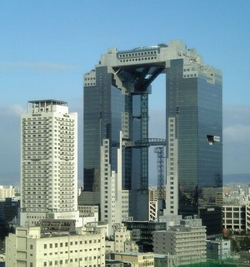 The APEC Economic Leaders met in Osaka, Japan, on 19 November, 1995, for the third time since the organization was created. Their primary agenda was to initiate the work of translating the Blake Island vision and the Bogor goals into reality.
The APEC Economic Leaders met in Osaka, Japan, on 19 November, 1995, for the third time since the organization was created. Their primary agenda was to initiate the work of translating the Blake Island vision and the Bogor goals into reality.
Declaration: In their Declaration, Leaders endorsed the Osaka Action Agenda, a blueprint for implementing their commitment to free and open trade and investment, business facilitation, and economic and technical cooperation. In the Action Agenda, they have agreed to a set of fundamental principles to guide the achievement of the liberalization and facilitation: comprehensiveness, WTO consistency, comparability, non-discrimination, transparency, standstill, simultaneous start, continuous process, and differentiated time tables, flexibility, and cooperation.
15. APEC 1994 Summit - Bogor, Indonesia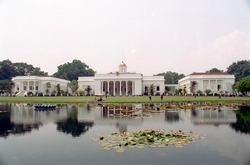 The second APEC Economic Leaders' Meeting (AELM) was held in Bogor, Indonesia, on November 15, 1994, which made the libralization of trade investment in the Aisa-Pacific region from “intention stage” into “real stage”.
The second APEC Economic Leaders' Meeting (AELM) was held in Bogor, Indonesia, on November 15, 1994, which made the libralization of trade investment in the Aisa-Pacific region from “intention stage” into “real stage”.
Declaration: The summit issued “Declaration of Common Resolve”, that is, “Bogor Declaration”, detemining the long-term planning for the libralization of trade investment in the region. They announced that “to complete the achievement of our goal of free and open trade and investment in the Asia-Pacific no later than the year 2020.” “The pace of implementation will take into account differing levels of economic development among APEC economies, with the industrialized economies achieving the goal of free and open trade and investment no later than the year 2010 and developing economies no later than the year 2020. This goal will be pursued promptly by further reducing barriers to trade and investment and by promoting the free flow of goods, services and capital among our economies.” It was the biggest achievement that the Bogor meeting gained on determining the timetable for the libralization of trade and investment.
16. APEC 1993 Summit - Blake Island, United States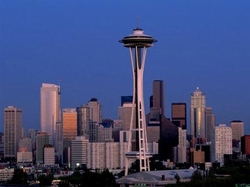 The first APEC Economic Leaders' Meeting (AELM) was held at Blake Island, near Seattle in 1993 since the establishment of APEC and it was upgraded to be a system for holding the informal leaders’ meeting, thereby creared a new stage for dialoque, exchange and negotiation. Leaders met.
The first APEC Economic Leaders' Meeting (AELM) was held at Blake Island, near Seattle in 1993 since the establishment of APEC and it was upgraded to be a system for holding the informal leaders’ meeting, thereby creared a new stage for dialoque, exchange and negotiation. Leaders met.
Declaration: The APEC Informal Leadership Meeting in Seattle released a statement called “APEC Leaders Economic Vision Statement” (also known as Black Island Prospect). The statement said that “we have held an unprecedented meeting of the economic leaders of the Asia-Pacific Economic Cooperation forum. In this post Cold War era, we have an opportunity to build a new economic foundation for the Asia Pacific that harnesses the energy of our diverse economies, strengthens cooperation and promotes prosperity. ” “We recognize this vision will become a reality only if we work together actively to secure it.” The statement reaffirmed their support for the continued development of APEC as a forum dedicated to producing tangible economic benefits to the region.




 Print
Print Save
Save
